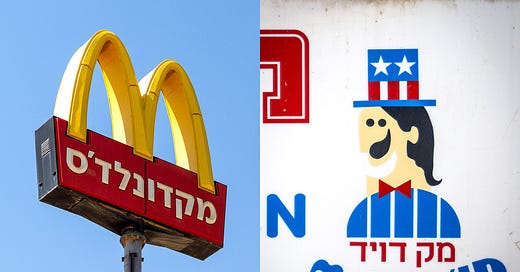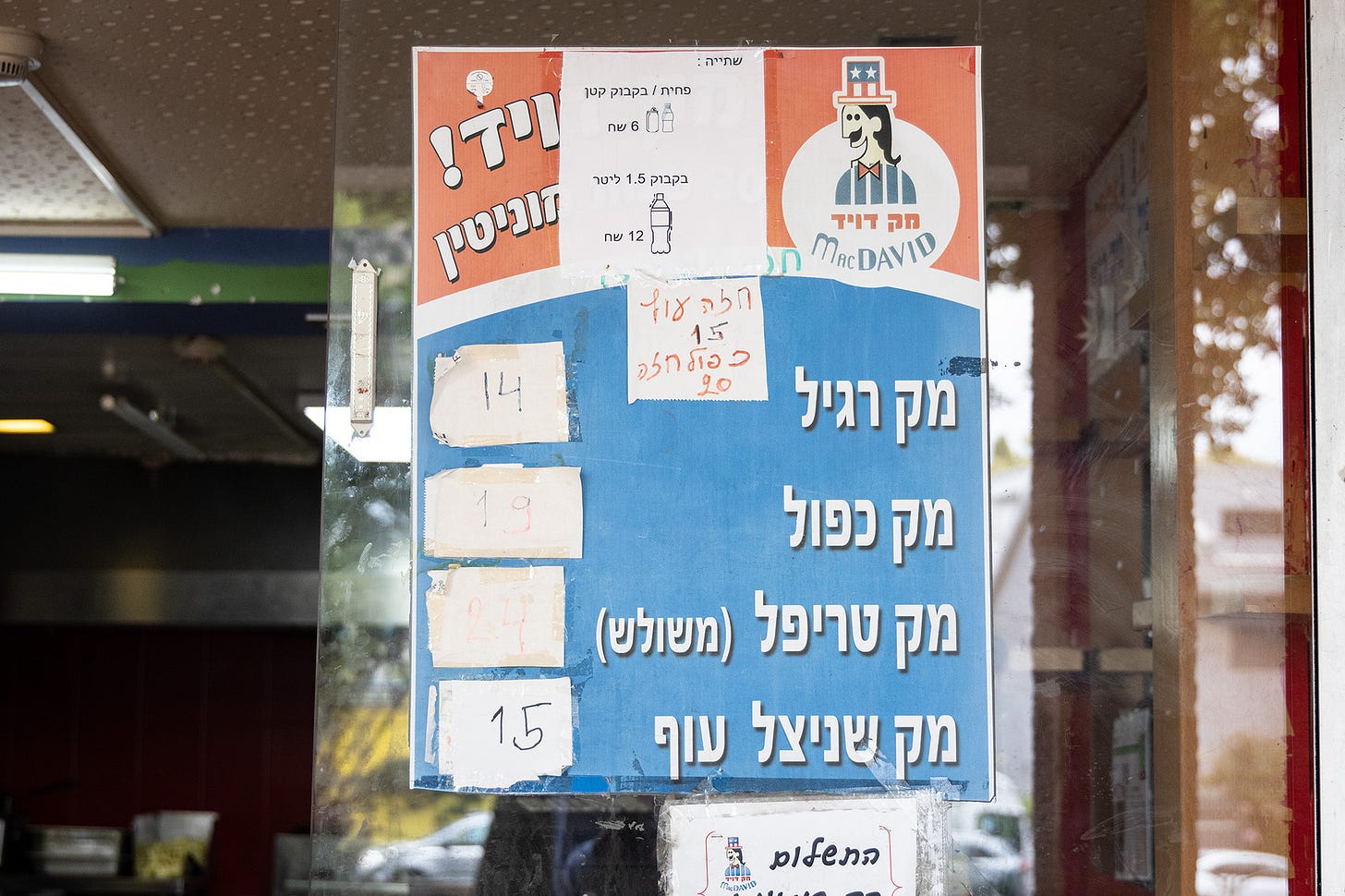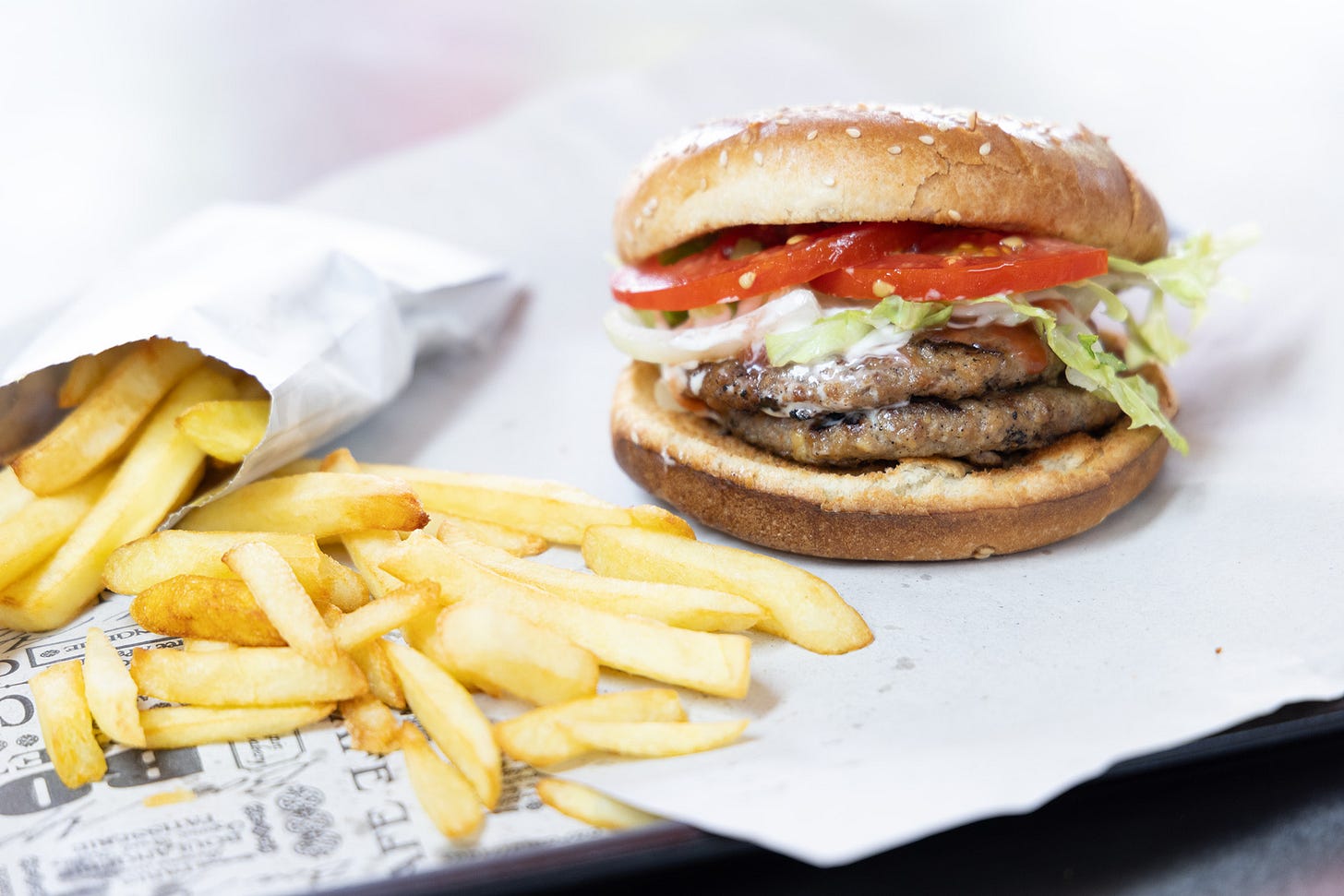Israel was the first country where I spent an extended amount of time specifically for McAtlas—up until that point, it had been entirely content creation on the back end of other trips. But in the spring of 2022, I turned on the afterburners.
McAtlas wasn’t even a book at the time. Friends that I leaned on for their Israel experience were briefed on a “McDonald’s sociology project”. Secretly, I was planning to launch a ‘zine that used the fast food chain as an anchor for culinary storytelling, one region at a time, beginning with the Middle East.
There would need to be a dozen or more vignettes: I did fieldwork at a military interchange with a sociology professor from Ben Gurion University, sat in a Jerusalem McDonald’s through Shabbat, spent an afternoon with a Haaretz reporter who had been reviewing local menu items, and ventured into the West Bank, where Arab KFC operators told me that they were waiting for their opportunity to franchise the Golden Arches.
When the project eventually became a book, the storytelling burden got spread across 50+ countries. Only the most culturally significant of the threads that I pulled on from the earlier trips became their own entries. The Kosher McDonald’s locations, corn sticks, and McGlida ice cream stores were obvious additions to the Israel section. The McFalafel got moved over to Egypt, where the item is still regularly sold. But there are many stories that did not make the cut at all. This is one of them.
MacDavid vs. Goliath
The year was 1978. McDonald’s had only begun opening stores in overseas markets several years earlier, but had no plans to expand into the Middle East, at least according to contemporaneous news reports. David Magen, a Tel Aviv-based building contractor, had reached out to McDonald’s to obtain a franchising license, but was ignored. So he opened his own restaurant at the busy intersection of Frishman and Dizengoff Streets.
With a cartoon Uncle Sam figure as its logo, MacDavid served standard American fare like burgers, french fries, milkshakes. But the thing that got the restaurant into trouble was a double-decker cheese burger slathered with sauce that they sold as a “Big Mac”.
Obviously, McDonald’s sued. Retaining five top Israeli patent lawyers, the chain filed for an injunction just seven months after MacDavid opened, claiming that the restaurant sought to mislead their customers. The end result was that Magen would have to stop using the Big Mac name for its products, something the restaurateur conceded to the press even before the ruling. But the name MacDavid was considered kosher, even if the food was not. The restaurant survived the legal action and thrived, growing to a peak of 28 stores across the country by the end of the 1980s.
Then in 1993, Rabin and Arafat shook hands on the White House lawn, defrosting Arab-Israeli relations. A month later, the Golden Arches arrived in the Middle East, via Israel and Saudi Arabia (For future researchers’ sake, I want to note that these two events are not directly related though it’s fun to put them right next to each other.)
Over the next three decades, McDonald’s did what it often does when it arrives in an overseas market: it steamrolled the competition. As it turns out, they didn’t even need a legal action to shut down the locals, just their iconic brand and operational superiority—there are now over 200 McDonald’s restaurants in Israel, but just one MacDavid.
I went up to the northern port city of Haifa in search of this last MacDavid, hoping that boots on the ground would give me something—anything—that was better than what I saw from my online research. No such luck, the restaurant was as ramshackle as it gets. The circular Coca-Cola logo had long ago fallen off the sign, leaving a black adhesive residue. The menu was faded and pasted directly on the glass door, with prices written on the back of receipts held up with yellowing tape. The golden era of MacDavid, this was not.
The kitchen looked frozen in time, more mom and pop than what you would expect of the one-time second largest burger chain in the country. I sat there nursing my “Double Mac” burger and fries through the entire lunch rush, which consisted of two people—and one of them was a Chinese guy from Brooklyn.
The burger was fine, nothing extraordinary. Since the arrival of McDonalds, restaurants here that offer U.S.-style fare no longer have a niche to fill. Customers looking for Americana will turn to the ultimate symbol of it: the Golden Arches.
McAtlas: Now Available
Thanks to everyone who has supported the book’s launch! Copies are available on McAtlas.com and select indie bookstores.







